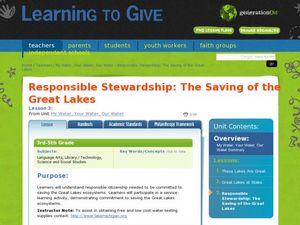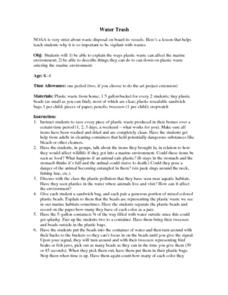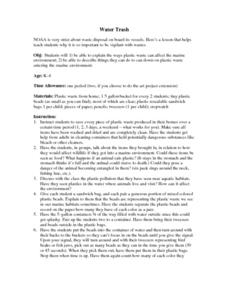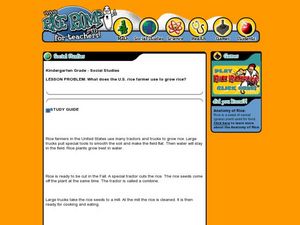Curated OER
Getting the "Yuck" Out
Students examine various types of household materials for their usefulness as filters. They work together in teams to design a filtration system that produces the cleanest water in the shortest time.
Curated OER
Responsible Stewardship: The Saving of the Great Lakes
Students devise a plan to protect the Great Lakes. For this environmental lesson, students conduct research to identify nonprofit groups that help protect the waterways. Students write letters to the Congressman or a nonprofit...
Curated OER
Sprinkles 5
In this environment learning exercise, students read the information and complete the survey about their own local habitats and some of the others in Florida.
Curated OER
Let it Grow and See What Happens
Students participate in an experiment in which they try to stop algae from growing. In groups, they develop a hypothesis and test it while making changes to the experiment along the way. They make observations and organize their data...
Curated OER
The Five Finger Exercise
Students understnad the importance of keeping our rivers and streams pollution free by remembering the major rivers of northeast Kansas. The see how the rivers contain particles of every substance that drains into them.
Curated OER
Marine Debris
Students will perform experiments to examine if debris will float, or blow in the wind. They discuss the effects of these characteristics on marine debris.
Curated OER
A Matter of State
Students explain that particle movement changes as a substance changes from one phase to another phase.
Curated OER
Water Trash
Learners explain the ways plastic waste can affect the marine environment. They are able to describe things they can do to can down on plastic waste entering the marine environment.
Curated OER
Water Trash
Students examine how plastic waste affects the marine environment. They describe techniques that reduce plastic waste in this environment after examining plastic waste that accumulates in their own homes.
Curated OER
Water and Rice Agriculture
Second graders investigate the agriculture of rice by reading a study guide. In this food making lesson, 2nd graders read about the irrigation of rice fields used for harvesting. Students write three sentences about the rice irrigation...
Curated OER
Relating Number of Insect Species to Water Quality
Students are asked to respond to questions such as:" Have there been surveys of the area to inventory the species?" (For example, for a wetland area, do they know what amphibians live there and how abundant they are?) Are there any...
Curated OER
Water 3: Melting and Freezing
Students explore what happens to the amount of different substances as they change from a solid to a liquid or a liquid to solid.
Curated OER
Groundwater: Cleaning Up
Students research the various aspects of groundwater contamination that threaten health and human safety. They create a model and display that informs other about the health and safety risks. Students illustrate ways in which these...
Curated OER
Wacky Water Critters
Students recognize the biodiversity that exists in a wetland ecosystem. They identify individual wetland organisms. Students define, identify, and comprehend the importance of adaptations. They describe the process of metamorphosis.
Curated OER
Measuring pH
Students perform an experiment which will illustrate how to measure the approximate pH of chemicals in water using a pH indicator. They understand that a pH indicator is a chemical that changes color when it comes in contact with acids...
Curated OER
Landscape Picture Map
Students explore pollution of water sources. In this ecology activity, students define and identify natural resources. Students use map skills to locate local rivers and lakes used for recreation. Students brainstorm ways in which to...
Curated OER
Activity #8 Simulation of Oil Spills
Students conduct an experiment to simulate an oil spill and identify the characteristics of oil in water. They evaluate the effectiveness of various cleanup methods. They discuss the how to clean up an oil spill, and what causes oil...
Curated OER
Lesson Six
Students investigate the importance of ocean resources and what humans need to do to maintain a healthy ocean. For this oceans lesson students participate in an activity after viewing a PowerPoint presentation on the Earth's Waters.
Curated OER
Invisible Neighbors
First graders explore the importance of keeping their body clean in order to maintain good health. They explore washing their hands and maintaining other good hygiene practices.
Curated OER
Observing Buffers In Lakes, Ponds And Streams
Young scholars observe the effects of limestone on the acidity of water. Some areas of the nation have a lot of limestone in lake bottoms and in soil, which helps neutralize the effects of acid rain. Students see this effect first hand.
Curated OER
What does the U.S. rice farmer use to grow rice?
Students discuss how a farmer grows rice. In this rice lesson, students discover the different tools needed to grow rice and how rice is cut and cleaned. They draw a picture of a rice farm.
Curated OER
Creek Restoration Project
Students gather and analyze scientific data from a local creek. Over weeks or months, students observe their local environment, collect water samples, and evaluate test results. Extension activities are suggested for evaluating...
Curated OER
Doghouse Design
Elementary engineers design a dog house suitable for a large dog according to specific criteria. Students create a design for a doghouse that allows their dog to grow, protects him from the elements, and keeps food and water dishes...
Curated OER
Ecosystem Damage from Household Cleaners
Third graders assess the damage done to various ecosystems by cleaning products and discover how scientists test water quality. Using stream water and common household cleaning agents, they work in groups to test for pH levels. Once...

























